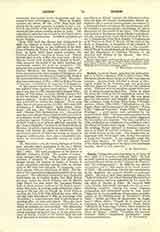

Cochin, PIERRE-SUZANNE-AUGUSTIN, b. in Paris, December 12, 1823; d. at Versailles, March 13, 1872. He took an early interest in economical and political questions and contributed articles to the “Annales de Charity” and “Le Correspondant”. In 1850 he was elected vice-mayor, and in 1853 mayor of the tenth district of Paris. His publications won for him membership in the Academie des sciences morales et politiques (1864). He was at that time prominent among the “Liberal Catholics”, an ardent friend of Montalembert and Lacordaire, and was supported by his party for the office of deputy of Paris. He received 6000 votes, but his democratic opponent won by an overwhelming majority. Among his many religious, pedagogical, and sociological works we may name: pedagogical, sur la vie, les methodes d’instruction et d’education, et les etablissements de Pestalozzi” (Paris,
1848); “Lettre sur l’etat du pauperisme en Angleterre” (Paris, 1854); “Progres de la science et de l’industrie au point de vue chretien” (Paris, 1854); “Abolition de l’esclavage” (Paris, 1861), crowned by the French Academy; “Quelques mots sur la vie de Jesus de Renan” (1863); “Condition des ouvriers francais” (1862); “Esperanees chretiennes” (posthumous publication).
J. B. DELAUNAY

